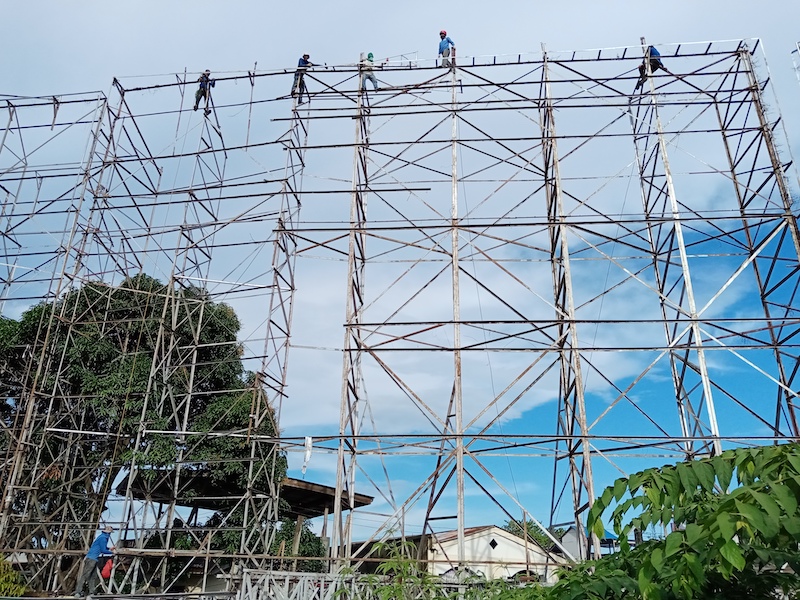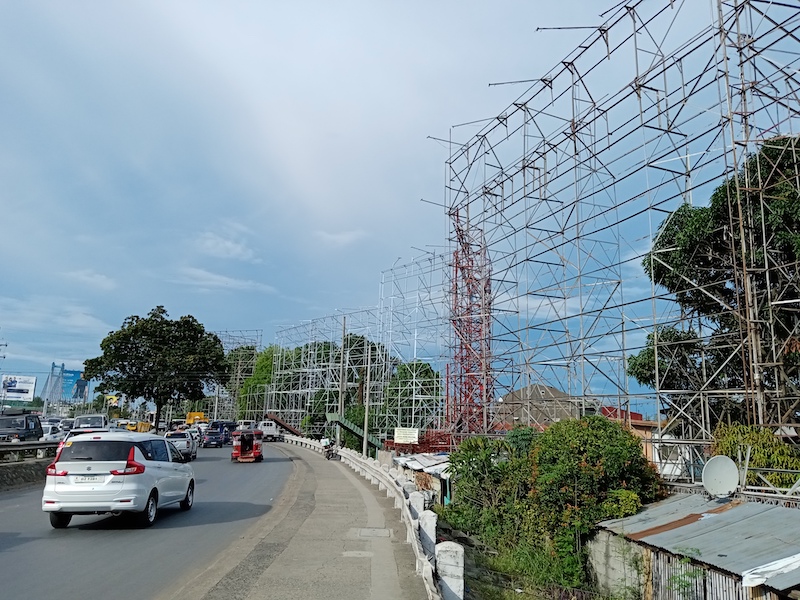DAVAO CITY (MindaNews / 12 September) -– Mayor Sara Duterte has ordered the removal of giant billboards here that block the natural view of the Davao River, Mt. Apo, skyline of the city, and Island Garden City of Samal, two years after the Supreme Court upheld the constitutionality of the 20-year old Signage Ordinance of Davao City.
The mayor said over Davao City Disaster Radio (DCDR 87.5) on Friday that she has directed the City Engineers Office to start the removal of the billboard structures after their owners failed to heed the order of the city government last month to voluntarily take them down.
“We wrote billboard owners last month, ‘look this is the ordinance that is being decided, the discussion had been exhausted in the courts. Please voluntarily demolish your billboards,” Duterte said.

Workers take down the billboards from corner Sandawa to Bankerohan to implement a two-decade ordinance banning billboards that block the natural view of the Davao River, Mt. Apo, skyline of the city, and Island Garden City of Samal. MindaNews photo by GREGORIO C. BUENO
The billboard owners are members of the Davao Billboard & Signmakers Association (DABASA), Inc. that challenged the validity of some provisions of the ordinance before the country’s highest court for its alleged “over-breadth in its application, vague, and inconsistent with Presidential Decree No. 1096 or the National Building Code of the Philippines (National Building Code).”
The challenged provisions are Sections 7, 8, 37, and 45, which regulate the placement of billboards to ensure unobstructed line of sight in residential areas and the designation of bridge approach areas as “regulated areas” in order to preserve, among others, the natural view and beauty of the Davao River, Mt. Apo, the Davao City Skyline and the view of Samal Island; prescribe fees for the application of sign permits; and vest authority upon the City Engineer’s Office to remove erring billboard structures.
The measure, known as “An Ordinance Regulating the Construction, Repair, Renovation, Erection, Installation and Maintenance of Outdoor Advertising Materials and For Related Purposes,” was passed on August 8, 2000.
In its 2018 decision, the Court said the authority to regulate billboards was valid exercise of police power under Republic Act No. 4354 otherwise known as the Revised Charter of the City of Davao (Davao City Charter), enacted on June 19, 1965, which vested the local council with the “legislative power to regulate, prohibit, and fix license fees for the display, construction, and maintenance of billboards and similar structures.”
The Court added that the DABASA also failed to specify what the specific provisions of the 1987 Constitution that had been violated by the ordinance.
The decision reads in part: “To invalidate an ordinance based on a bare and unilateral declaration that it is unconstitutional is an affront to the wisdom not only of the legislature that passed it but also of the executive which approved it.”

Davao City Mayor Sara Duterte has ordered the removal of billboards from corner Sandawa to Bankerohan to implement a two-decade ordinance banning billboards that
block the natural view of the Davao River, Mt. Apo, skyline of the city, and Island Garden City of Samal. MindaNews photo by GREGORIO C. BUENO
Duterte said the owners must refund the city government for the cost in removing the structures and warned that it would withhold the materials of the dismantled billboards unless they refund the city.
After the mayor issued this stern warning, she added that some owners reached out informing the local government that they would take down the billboards themselves.
“I told the City Engineers Office that if the owners would say they voluntary remove the billboards, let them do that so that we will no longer pay for it,” she said.
She said that the city government has to enforce the ordinance to give justice to the work of City Council of Davao in drafting legislations.
“If I don’t implement it, it’s like taking the power of Sangguniang Panlungsod to create laws for granted. They always burn the midnight oil, making those documents and the mayor would suddenly say, ‘let’s not implement it.’ That is not the way to go. We have an ordinance that won in the Court, and then we implement the ordinance,” she said.
She said DABASA members had been heard enough through the filing of cases in the court, starting in 2006 until its conclusion in 2018. (Antonio L. Colina IV / MindaNews)
